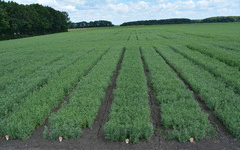
About the Journal
Focus and Scope
“Plant Varieties Studying and Protection” Journal of Applied Research publishes experimental and review articles which have not been published before and are not considered for publication in other journals, have essential scientific, theoretical and practical value and are a result of original studies. The Journal also publishes materials on persons (anniversary and chronicles)
The programmatic aims of “Plant Varieties Studying and Protection” Journal of Applied Research is scientific inquiry, publications of plant variety studying and science, genetics, breeding and seed production, plant physiology, biotechnology and biosafety, plant production, plant variety market, plant varieties protection, international cooperation, information systems and technologies, young scientist's view, history of science.
The article should be reasoned and properly prepared. The Journal “Plant Varieties Studying and Protection” is not a tool for publications of patents, inventor certificates, inventions, other objects of intellectual property, idea propositions and notes, popular science articles, etc. The decision on the publication is taken after a reviewing procedure taking into account the scientific importance and relevance of presented materials. The articles in the Journal are published in Ukrainian and English.
The editing policy is oriented on the regulations of the Committee on Publication Ethics (COPE). Our edition editing the ethics of the journal Czech Journal of Genetics and Plant Breeding. Double-blind reviewing manuscripts is practiced in the collection; and self-citation and rewriting control is performed in Etxt Antiplagiat program.
Peer Review Process
Initial manuscript evaluation Every manuscript submitted for publication is read at least by an editor, for an initial review. It is rare, but it is possible for an exceptional manuscript to be accepted at this stage. Manuscripts rejected at this stage are insufficiently original, have serious scientific flaws, have poor grammar, or are outside the aims and scope of the journal. If the submission agrees with editorial policies and with a minimum acceptable quality level, it is sent for peer review.
Type of Peer Review Our journal employs double-blind peer review process, where both reviewers and authors remain anonymous throughout the review process. All manuscripts of research articles are submitted to at least two anonymous experts.
How the reviewers is selected Whenever possible, reviewers are matched to the paper according to their expertise and our database is constantly being updated. Reviewer selection is critical to the publication process, and we base our choice on many factors, including expertise, reputation, specific recommendations and our own previous experience of a reviewer's characteristics. For instance, we avoid using people who are slow, careless, or do not provide reasoning for their views, whether harsh or lenient.
Conflicts of Interest Editors and reviewers involved in the review process should disclose conflicts of interest resulting from direct competitive, collaborative, or other relationships with any of the authors, and remove oneself from cases in which such conflicts preclude an objective evaluation. Privileged information or ideas that are obtained through peer review must not be used for competitive gain.
Reviewers reports Reviewers should give a clear statement of recommendation for each manuscript and supply comments to support their recommendation suitable for transmission to the author. Reviewers are asked to evaluate whether the manuscript:
- Is original
- Is methodologically sound
- Follows appropriate ethical guidelines
- Has results which are clearly presented and support the conclusions
- Correctly references previous relevant work
Language correction is not part of the peer review process, but reviewers may, if so wish, suggest corrections to the manuscript.
Reviewers have four possible options for each manuscript:
- Accept Submission
- Accept with minor revisions
- Request author to do significant revisions and likely re-review
- Reject Submission
In cases where there is strong disagreement either among peer reviewers, further expert advice may be sought.
Final decision A final decision to accept or reject the manuscript will be sent to the author along with any recommendations made by the reviewers, and may include verbatim comments by the reviewers. Editors Decision is final. Reviewers advise the editors, who are responsible for the final decision to accept or reject the article.
Becoming a reviewer for our journal If you are not currently a reviewer for the Plant Varieties Studying and Protection but would like to be included in our database of potential reviewers, please register as a reviewer on this website or contact the editors. The benefits of refereeing for the Plant Varieties Studying and Protection include the opportunity to read, see and evaluate the latest work in your research area at an early stage, and to contribute to the overall integrity of scientific research and its published documentation. You may also be able to cite your work for our journal as part of your professional development requirements.
Open Access Policy
Plant Varieties Studying and Protection is published under the Open Access model and is therefore free for anybody to read and download, and to copy and disseminate for educational and scientific purposes. Open Access enables authors to obtain the maximum possible exposure for their work.
Plant Varieties Studying and Protection is accessible via journal website as well as via international search engines.
Starting in 2022, the copyright to the publication remains with the authors.
The journal is licensed Creative Commons Attribution-ShareAlike 4.0 International License


















 Ukrainian Institute for Plant Varieties Examination
Ukrainian Institute for Plant Varieties Examination  Селекційно-генетичний інститут
Селекційно-генетичний інститут Institute of Plant Physiology and Genetics of the National Academy of Sciences of Ukraine
Institute of Plant Physiology and Genetics of the National Academy of Sciences of Ukraine
 The National Academy of Agrarian Sciences of Ukraine
The National Academy of Agrarian Sciences of Ukraine